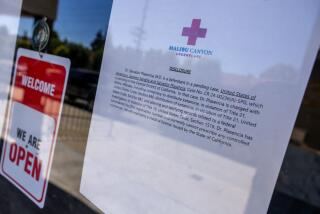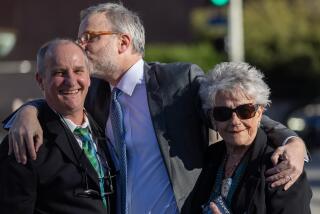License Hearing Set for Doctor in Drug Probe
In the autumn of 1982, a state undercover agent visited the El Cajon office of Dr. John Robert Welch and indicated an interest in obtaining the drug Ritalin, a powerful stimulant sometimes used to treat behavioral disorders.
According to a suit by the Board of Medical Quality Assurance (BMQA), Welch sold the agent the drugs in a clear, unlabeled plastic bag for about $200 in cash, without performing a medical examination.
On numerous other occasions between Sept. 24, 1982, and Nov. 29, 1984, Welch sold controlled drugs including Ritalin and Quaaludes to patients and undercover agents, state officials charge.
Two and one-half years have passed since that first drug sale, state officials say, but Welch still has his medical license and is still seeing patients.
Today in Superior Court Judge Douglas Woodworth’s courtroom, state deputy Atty. Gen. Holly Wilkins is scheduled to argue that the doctor’s license should be revoked until a full hearing on the suit that seeks to permanently remove his license.
Welch sold the drugs to people who were, in some cases, “known drug addicts,” according to the documents filed Feb. 21 by Wilkins on behalf of the medical board.
Welch denies the accusations, though he declined to talk to a reporter. Welch’s attorney, John Mitchell, said he had no comment.
Much of the state suit stems from 14 criminal charges filed against Welch in December, 1983, accusing him of unlawfully prescribing drugs and making false claims to the state Medi-Cal program.
On April 25, Welch pleaded no contest to a misdemeanor charge of prescribing drugs to a person not under his treatment. A judge placed him on three years’ probation, fined him $2,500, and ordered him to perform 200 hours of volunteer work. The other 13 charges were dismissed as part of the plea bargain.
Welch later spent a day in jail--as the cellmate of financier J. David (Jerry) Dominelli--on a charge of threatening an Internal Revenue Service agent last year. Welch was accused of threatening to sew the agent’s mouth shut and “fill him full of holes.”
Welch pleaded guilty last year to resisting an agent doing his duty and was placed on probation for a year by U.S. District Court Judge Gordon Thompson.
Welch is among about 200 doctors each year whose licenses BMQA seeks to revoke. About one-third of those cases involve the misuse of drugs, said Steve Wilford, assistant to the executive director of the BMQA.
Wilford said the state agency took until two weeks ago to go to court to revoke Welch’s license because of the pressure of handling other cases.
Under state law, if the temporary restraining order is issued, the BMQA’s 19-member board has 75 days to decide whether to take away Welch’s license permanently.
Welch’s motives were not “good samaritanism,” Wilkins said in an interview this week. Rather, he was charging up to $200 for a bag of drugs, “a substantial profit.”
Welch’s activities were first detected by the state Bureau of Narcotic Enforcement, which “has a special division which is designed to detect the diversion of drugs from legitimate channels,” Wilkins said.
By routinely monitoring copies of prescriptions, bureau officials believed that Welch was providing an unusual number of patients with certain controlled drugs. They informed the San Diego County district attorney’s office and suggested the possibility of an undercover investigation. Meanwhile, the state Justice Department began investigating Welch’s billings to the Medi-Cal program.
“It appears from the evidence he has not been practicing medicine for years,” Wilkins said. “It appears he has been furnishing drugs (and) making claims to Medi-Cal that are simply false. . . . We have information that patients are walking in and receiving drugs and leaving.”
Mitchell has responded to Wilkins’ charges by filing statements from three doctors “attesting to John Welch’s competency,” Wilkins said. She identified them as Drs. Karl H. Sturckow, Charles M. Garrett Jr. and George C. Brown Jr.
Also, Welch has stated that he “was caring for four patients who are seriously ill and would suffer if he is restrained” from practicing medicine, Wilkins said.
Brown told The Times he is Welch’s private physician and has known him since 1961. Brown signed the statement submitted to the judge because he believed Welch “was being denied his privileges without a hearing . . . He’s a very upright person; I’ve had nothing but good dealings with him in the past.”
Sturckow said that Welch has “been a fine physician throughout the years.” The allegations are “hard to believe . . . He still does good work in the hospital.”
Sturckow said Welch recently told him that the adverse publicity has boosted his patient business.
The attorney general’s suit also alleges that the doctor owes the IRS more than $100,000. In April, the IRS seized two of his properties.
Welch received his medical training at the University of Colorado, BMQA records indicate. He has been licensed to practice medicine in California since 1960.
At El Cajon Valley Hospital, Welch is a member of the courtesy staff and “is infrequently here. We haven’t seen much of him lately,” spokeswoman Lynn Ropay said.
Neither El Cajon Valley nor Grossmont Hospital, where he is also on the courtesy staff, has taken action yet on his status there, officials at the two hospitals said.
More to Read
Sign up for Essential California
The most important California stories and recommendations in your inbox every morning.
You may occasionally receive promotional content from the Los Angeles Times.










